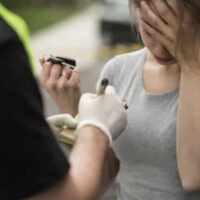What Police Officers Look for During a DUI Stop

Law enforcement officers are directed to look for specific things when they pull someone over for driving under the influence, such as weaving, swerving, drifting into other lanes, sudden braking, and driving too slowly. They also assess a driver’s response to the officer’s signals, taking note of how long it takes the driver to pull over and whether he or she does so safely. Vigilance issues, like driving without headlights at night or failing to signal are also considered signs of impairment. Officers who observe these cues can pull someone over on suspicion of driving under the influence, at which point they will start looking for additional cues indicating that a driver is under the influence.
Signs of Driver Intoxication
During the personal contact phase of a DUI stop, officers will observe the driver and start looking for evidence of driving under the influence, such as:
- Bloodshot eyes;
- Alcohol containers in the vehicle;
- Odor of alcoholic beverages in the car or on the driver’s person
- Difficulty handling vehicle controls;
- Fumbling with a driver’s license or registration;
- Difficulty exiting the vehicle;
- Repeating comments or questions;
- Slurred speech;
- Offering slow responses to the officer’s questions; and
- Changing answers or providing incorrect information.
Once out of the vehicle, officers will take note of whether the driver is swaying, unsteady, or otherwise exhibiting balance problems. Leaning on the vehicle or another object for balance is also considered a sign of inebriation. While this evidence isn’t as definitive as a BAC or field sobriety test in establishing that a driver was under the influence, it can be very convincing to a jury if the officer notes the details in his or her report and testifies to them in court.
Refuting Police Officer Testimony
Just because an officer observes certain cues that are indicative of intoxication does not mean that a driver was actually under the influence. There could, for instance, be a reasonable explanation for certain behaviors and physical symptoms. Someone with bloodshot eyes, for example, could be suffering from allergies or be fatigued, while an issue with balance could be the result of a disability or an unrelated physical ailment. Those who have been accused of drunk driving can raise these, and other defenses, on their behalf to refute an officer’s allegations of drunk driving, especially if the results of the BAC or field sobriety tests were inconclusive. The kind of arguments that a defendant raises will, however, depend on the specific circumstances of his or her case, which is why it’s so important to speak with an attorney as soon as possible after a DUI arrest.
Reach Out to an Experienced Cobb County Legal Defense Team
Being arrested for driving under the influence can leave people feeling helpless and confused. There are, however, steps that you can take to lower your chances of an unfair conviction. For an evaluation of your case and potential legal options, call experienced Cobb County DUI lawyer Andrew L. Schwartz, P.C. today. You can set up a meeting by reaching out to our legal team at 678-853-2500 or by filling out an online contact form.
Sources:
nhtsa.gov/sites/nhtsa.gov/files/808677.pdf
nhtsa.gov/sites/nhtsa.gov/files/documents/sfst_ig_refresher_manual.pdf
